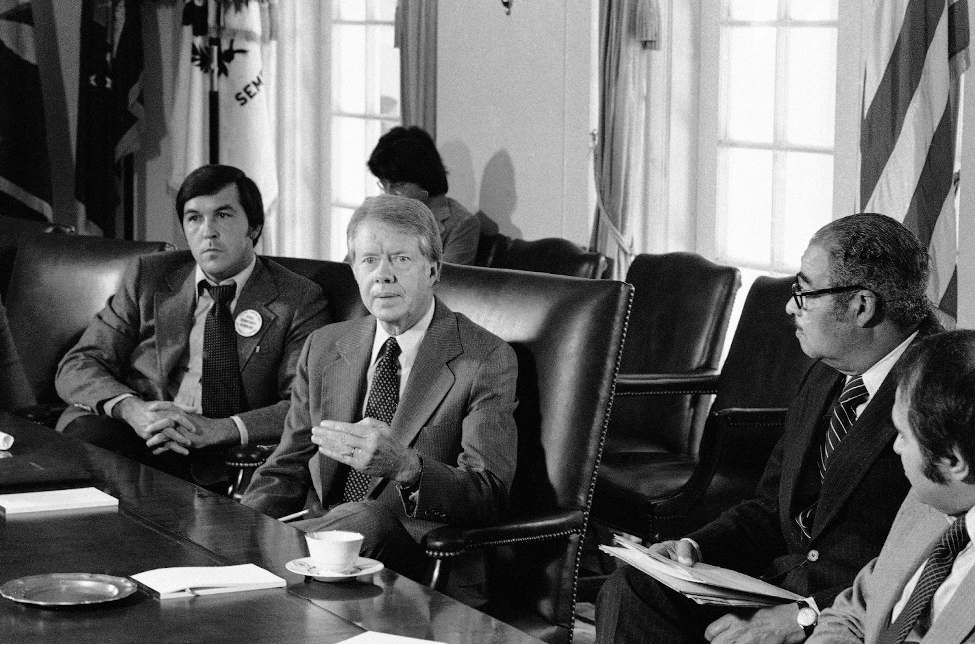
A common sentiment I’ve noticed among both modern supporters and detractors of former President Jimmy Carter is that he was a morally upstanding and good person. Central to both of these arguments is the perceived positive moral character of Carter; to one side this was twisted as being overly empathetic and weak in leadership, while to the other it was an unrewarded virtue. For his critics, this reinforces the image of Carter as a meek, bleeding-heart liberal that led the economy astray with stagflation, embarrassed the US with his foreign policy, and was ineffectual in accomplishing anything. The opposing narrative is that Carter was too good of a person to be President, though he wasn’t even a particularly bad one at that (especially compared to Nixon and Reagan, who came before and after Carter). His ineffectual presidency serves as this demonstration of how the cruel world of politics crushes those who try to do good. I feel that the positive view many people have of Carter as a person today is based on applying the perception of his extensive post-presidency philanthropy and charity work retroactively to his political career. The truth is that Carter was pragmatic and morally rigid to a fault and an ineffectual president relative to what he could have accomplished with a Democratic trifecta and supermajority behind him.
I characterize Carter’s political philosophy as being uncompromising in what he believed was necessary to help others, regardless of whether it was popular or not. As his close aide, Hamilton Jordan, would often joke, “the worst argument to make to President Carter to dissuade him from action was that it would hurt him politically.” No decision exemplifies this more than Carter’s choice to appoint Paul Volcker as chairman of the Federal Reserve in 1976. Faced with persistent inflation throughout his Presidency from large amounts of prior deficit spending, the monetary shock from Nixon’s policies, and a massive spike in oil prices, Carter appointed the known inflation hawk Volcker as Fed Chair — Volcker subsequently embarked on a massive hike in interest rates to intentionally induce a recession. Carter killed and buried any chance of reelection for himself by doing this. Monetary policy takes time to work, and it wasn’t until years after Carter’s defeat to Reagan that inflation finally came down. I admire Carter’s conviction to do what he believed to be the right thing in spite of political pressure to conform. The problem is that many of his views were bad.
During his campaign, Carter espoused a progressive economic agenda but ended up quickly turning to the rhetoric of fiscal conservatism when he was elected. He promoted the importance of balanced budgets and viewed new spending policies on welfare and healthcare with skepticism. Carter adopted the fiscal conservative label himself, his press secretary Jody Powell vocalizing to critics “last summer and fall we . . . tried to tell you he is a fiscal conservative.” This drew ire from many other Democrats and Carter was forced to manage an awkward coalition of support within Congress.
This shift in policy was likely caused by Carter’s conclusion that inflation was the primary threat to the well-being of the American people. Carter walked back on campaign promises and worked directly against members of his own party on many occasions. He vetoed a cut to the military budget recommended by the House Budget Committee, he delayed and dismissed proposals of welfare reform, and he tried to repackage his promises of tax reform as being tax cuts on independent oil producers and the withdrawal of a proposed universal $50 tax rebate. Perhaps most consequently, he refused to support a bipartisan national healthcare proposal by Ted Kennedy, citing concerns over the cost, and tried to water it down to a more moderate proposal. This led to nothing being passed at all– Despite the fact that Democrats had a filibuster-proof majority in both houses.
Carter’s blanket adherence to balanced budgets and fiscal conservatism meant that he often failed to differentiate between the policies that would’ve been greatly beneficial to Americans and frivolous government spending. The ironic situational inverse of this situation is the Democrats who knowingly risked their seats and political careers in order to pass Obamacare. This kind of moral rigidness is admirable if it’s for the right cause and as we see, this was not always the case for Carter.
The Iranian Hostage Crisis is widely considered the greatest embarrassment of the Carter presidency but one that is rarely blamed on Carter himself. After all, he couldn’t have predicted the catastrophic failure of the helicopters to even reach the Desert One site. However the source of the hostage crisis itself can be traced directly back to Carter’s support for the Iranian monarchy and the Shah. In his 1977 speech where Carter called Iran an “island of stability” he praised Pahlavi as an ally and helped legitimize his rule in spite of his oppressive regime. Even after the Iranian Revolution Carter maintained his support for the Shah, offering him refuge in America. Despite being advised by numerous officials that expressing support for the Shah would endanger US officials in Iran Carter made the asinine choice of allowing the Shah to enter into the US for medical treatment. This decision ignited mass protests against the US embassy which led to the hostage crisis. By refusing to cast away or even loosen his support for the Shah, Carter not only ended up inciting the hostage crisis but poisoned the relationship between the US and Iran. What many see as Carter’s greatest virtue was in fact his greatest flaw.
